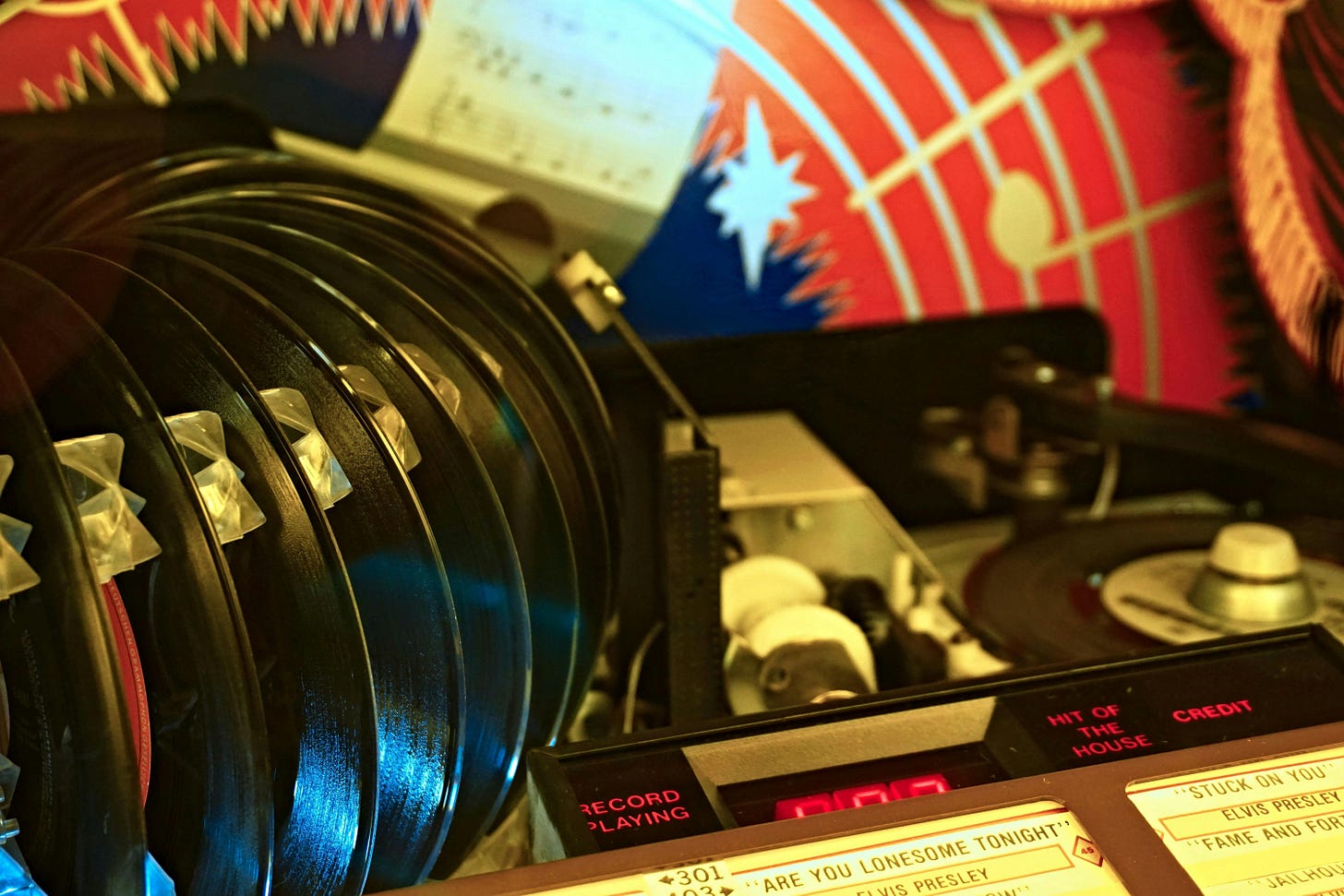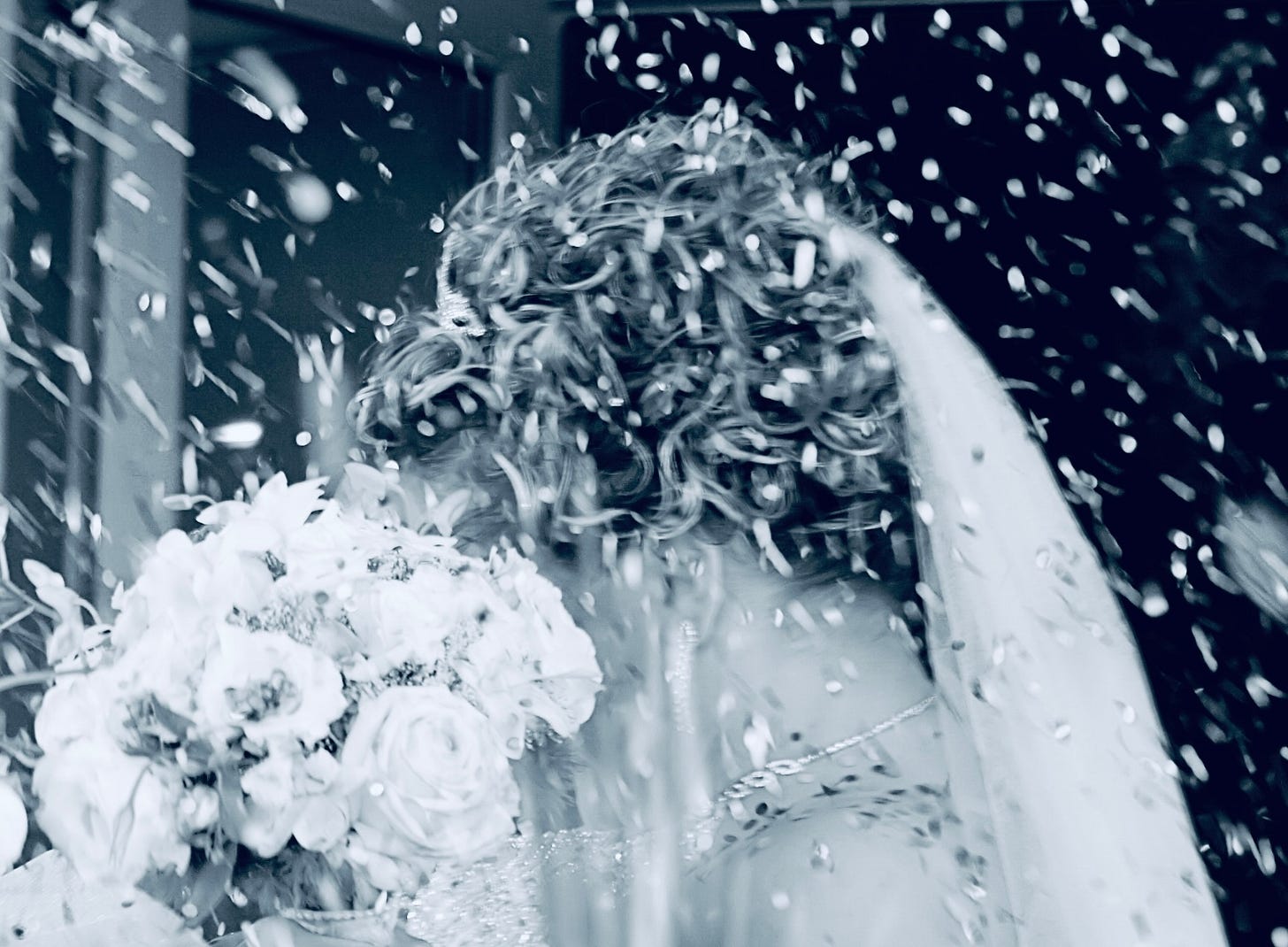The Blues & Billie Armstrong 12
RICE LIKE HAIL
Previously in The Blues & Billie Armstrong…
I closed up the cabinet again, shut the door on my way out, and I took the records to my room and stashed them in the bottom drawer of my dresser under two ugly sweaters Grandma Junia had given me over the years, neither of which I’d ever worn.
I didn’t notice the change in my father until an official family meeting was convened for the announcement.
Grandma Junia was fond of saying I was “slow on the uptake,” and there was the salt of truth in that, especially in those first months after my mother’s death when I lived in my thirteen-year-old head with little attention leftover for the turning of the wider world.
The meeting was held at the oak table in the yellow kitchen, with my father, Grandma Junia, Aunt Laurette and myself present. The big announcement was that my father was engaged to marry a woman named Darlene Beverly, an advertising saleslady from Cleveland whom he’d met at a newspaper industry trade show in Las Vegas. That spring it had become common for my father to be away from home on “business trips,” but I was unaware of this woman’s existence until that very moment.
The below-the-fold headline was that Darlene Beverly was the mother of a teenage daughter. “You’ll meet her,” my father said. “She’s seventeen, her real name is Barbara, but I’m told she likes to be called Billie. She’s an art student at some college out there in Ohio.”
Reverend Martin Jameson was to preside at the ceremony, five o’clock, Saturday, April 25, 1970, at St. John’s Episcopal Church in downtown Lupoyoma. It was made clear that my attendance was compulsory, no RSVP required. Reception to follow, with hors d’oeuvres and open bar, at the Lupoyoma Yacht Club.
Darlene Beverly arrived from Cleveland a week before the wedding in a rented Ford station wagon with simulated wood trim all down the side. She was a pudgy bottle-blonde with a full face and an air of perpetual fluster. Other than some suitcases and a few boxes of keepsakes, the station wagon was empty. I didn’t speak up but I thought, where’s the daughter?
The day before the wedding, the girl had still not arrived as planned, and this precipitated another kitchen gathering, which included a series of teary and frantic phone calls made by Darlene to hospitals and roommates and police stations, and a series of skeptical harrumphs from Grandma Junia as none of the phone calls yielded knowledge of the girl’s whereabouts. Aunt Laurette made cocktails, and my father took off his glasses and rubbed the bridge of his nose. Darlene talked of postponement, but my father’s show-must-go-on stoicism prevailed. Even his wedding had to make deadline.
I wore the dreaded JC Penney’s Dodger blue suit, though the pants now ended at my ankles and my hands remained visible at all times.
Grandma Junia wore a silver-gray skirt-suit and greeted me on the steps of the church with mock surprise at my latest growth spurt. “And who is this handsome young man?” she said in the upper register of her voice, with the Buick eyebrows rising up to the middle of her forehead.
I seated myself next to Grandma Junia in the front-row pew. When the first notes of Here Comes The Bride hit the church P.A. system, she signaled me to stand up and turn as Darlene appeared at the back of the church. Grandma Junia whispered through her smile like a ventriloquist, “At least she didn’t wear white.”
I had no memories of my father dancing with my real mother. I had never seen them kiss in public or clink glasses or laugh at a private joke with their heads nearly touching. I had never seen a shine in their eyes like I saw that day in the eyes of my father and Darlene Beverly. I flowered the wall in my Dodger blue suit, sipping syrupy punch from a styrofoam cup, watching the newlyweds and guests turning slowly to Elvis and Sinatra records played on the Yacht Club’s jukebox: I Can’t Help Falling in Love with You, The Very Thought of You. Lush and breathy songs that twinkled and sighed in the warm April evening.
Darlene Beverly had a nervous laugh which she employed to diffuse even the slightest hint of awkwardness in social situations. At one point she hurried over and coaxed me onto the dance floor. Our arms didn’t reach an immediate understanding about how we should touch each other, so she laughed and took both my hands in hers and held them out between us as we rocked side to side to the beat of Fly Me to the Moon. She leaned in and said, "You don’t have to call me Mom if you don’t want to, Archer. You can just call me Darlene.”
I didn’t tell her there was no chance in hell or Lupoyoma I was going to call her Mom in the first place. I didn’t tell her that I preferred the rhythm of her full maiden name, Darlene Beverly, a name in five-four time. Because my father may have given her our name, but I had not.
Rumors swirled about the room like a dressed up version of the old children’s game of Telephone. Wherever Darlene was not present, speculative talk of her missing daughter could be overheard. Playing the innocent, I made myself invisible in that way children sometimes can—simply by allowing the adults in the room to pay as little attention to you as they prefer—and I circulated to get the scoop.
Grandma Junia stood near the punch bowl, which was arrayed on a folding table drenched in screaming-pink crepe paper and overgrown with dusty plastic flowers. Miss Lancaster, one of grandmother’s most reliable acoloytes, and the very same teacher who’d sentenced me to the principal’s office for bringing Robyn the horse artist to tears, ladled punch for Grandma Junia. I loitered in close proximity, imagining myself a clever reporter.
“And what’s this news about the teenage daughter?” Miss Lancaster was a large and solid person. Polite women referred to her as statuesque. Some of the boys at school had nicknamed her Mancaster. In the words of Timmy Bilderback, she was “built like a brick shithouse.”
“Yes, an unexpected complication,” Grandma Junia said. “Frankly, we’ve been misled, I’d almost say hoodwinked. We were told this girl was nearly of age and living on her own. She would come for the wedding, then return to art school somewhere in the wilds of Ohio.”
“Oh, an artist!” Mancaster said, straightening her big shoulders.
“Worse than that!” Grandma Junia said with one hand to her mouth, shielding the wider public from the horrific news. “We’ve learned she’s not enrolled in school at all. And, in fact, never finished high school. She ran away from home at fifteen and lately she’s been shacked up at some low-rent flophouse with a gang of these college radicals you see on the news. And now, predictably, she’s been arrested!”
Miss Lancaster went silent, appropriately aghast, and I casually moved on as if oblivious. I made my way across the room, where several men clustered around the tiki bar. My father was in chummy conversation with Leslie McGoogan, the Call & Record’s smooth and well-mannered ad man, who looked and dressed like the famous crooner Perry Como. He was a master of cardigan sweaters and sympathetic nods.
“Chief Timmons made a few calls, she’s being released to our custody,” my father said.
“Oh, now you’re really stuck,” McGoogan nodded.
“They’re putting her on the next bus—at my expense, of course.”
“Fatherhood is overrated.”
“And overpriced,” my father said.
McGoogan raised his glass.
Over by the jukebox, Aunt Laurette and Darlene Beverly tapped their feet to Elvis and scanned song titles. Darlene’s hand drifted over the glass top of the machine like a Quija board. I stood off to the side and gazed in the other direction, pretending to be interested in the old people on the dance floor.
“She’s not a bad girl,” Darlene said. “She’s high-spirited. It’s just this awful war has all the kids so upset.”
“You better tell her to go easy on her opinions around Mike,” Laurette said.
“I just hope it’s not too much, both of us moving in at the same time.” Darlene said.
“And watch out for Junia. She’s the main one to worry about in this family… but you probably already figured that out.”
Darlene laughed her nervous laugh.
“I’ll come over tomorrow and help you get the spare room ready for Billie,” Laurette said. “No one’s been in there since… well, you know.”
That’s when it hit me that this girl was coming to live with us—once again, a little slow on the uptake—and the spare room Aunt Laurette was referring to was the dayroom. I must have dropped something or gone pale in the face, I don’t remember, but Darlene Beverly noticed, and she stepped over, put a hand on my shoulder and smiled, “Archer, don’t worry, I’m sure you and Billie will get along famously. She’s quite a personality, really. Very creative and artistic and smart and… hip, she’s very hip. Or is it hep?”
Grandma Junia, eavesdropping some of this for herself, sidled up with a saccharine smile and muttered just to me, “We haven’t even met this girl and already I’m sick of her.”
The cake was cut, the toasts were made, the bouquet was tossed over Darlene’s shoulder and plummeted to the floor after Laurette sidestepped it like a falling rock. But my favorite part of the entire event was throwing the rice. I held back while husband and wife ran the gauntlet of tipsy guests who laughed and tossed the rice in the air so it fell on the couple like soft rain. I stood further away, and when they emerged from the widening tunnel of people and were almost to the getaway car, I pelted them both with two handfuls, launched at a lower trajectory—more windblown hail than soft rain.
Grandma Junia quickly stayed my arm, but not before I saw each of the newlyweds raise a surprised hand to the sting on their cheek.
The Blues & Billie Armstrong is a work of fiction. Names, characters, businesses, places, events and incidents in this book are either the product of the author's imagination or used in a fictitious manner. Any resemblance of the fictional characters to actual persons, living or dead, is purely coincidental.
© All Rights Reserved




I was a bit confused by the intro here, a supposed recap from Chapter 11? I couldn't find that passage in Chapter 11, though.
"I closed up the cabinet again, shut the door on my way out, and I took the records to my room and stashed them in the bottom drawer of my dresser under two ugly sweaters Grandma Junia had given me over the years, neither of which I’d ever worn."
Did I miss something?